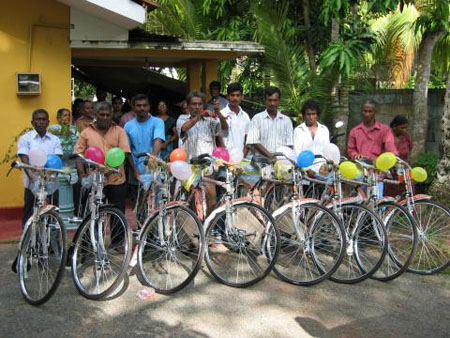You’re not blocking the traffic.You are the traffic!
Chris Trueblood becomes part of the Critical Mass of Sri Lankan cyclists
In September I returned to Sri Lanka after two previous visits in 2002 and 2004 to undertake some voluntary work with LEADS a Non Governmental Organisation (NGO) based in the capital Colombo. On Boxing Day 2004 an earthquake measuring 8.9 on the Richter Scale hit South East Asia. A giant tidal wave or tsunami swept across the Indian Ocean striking the Sri Lankan coast. The devastation that unfolded was horrifying. As with all natural disasters relief aid poured into the affected areas. Disaster Management Schemes and NGO Task Force teams are well prepared for such crises. However nine months on many families in the affected communities are living in temporary shelter waiting for new houses to be built.
At home I am a Community Development Officer in Irlam and Cadishead with Salford City Council. In Sri Lanka I was based at Matara on the southern tip of the island, interviewing families in temporary camps. It was demanding and time consuming, ensuring that all the documentation was complete to guarantee their eligibility for new house building programmes.
A new President Mahinda Rajapakse has recently been elected but widespread government corruption remains a common feature. The volatile long-standing civil war with the LTTE (Tamil Tigers) rumbles on in parts of the island and the peace agreement appears to be abandoned
Travelling in Sri Lanka can be a real challenge as roads are gridlocked at peak times. Downtown Colombo is very congested. Negotiating the main road from Colombo to Galle in the south is a risky and tortuous experience. So blocking traffic means you are the traffic.
Cycling remains one of the most popular and accessible forms of transport.
Many people in urban and rural communities cannot afford motorised vehicles, People and goods are moved in a number of improvised ways – bikes with trailers, modified bullock carts, rickshaws and side cars. Animal power is also persistent in many areas.
Many NGOs are working on Bicycle Distribution schemes, essential in village and coastal communities. Designing vehicles for the disadvantaged and disabled is also crucial to these projects.
Sri Lanka remains a popular tourist destination and several tour operators offer bike holidays. This is the best way to experience the scenery, local culture and warm hospitality. Two wheeled travel creates a real understanding of the spirituality of the island.


